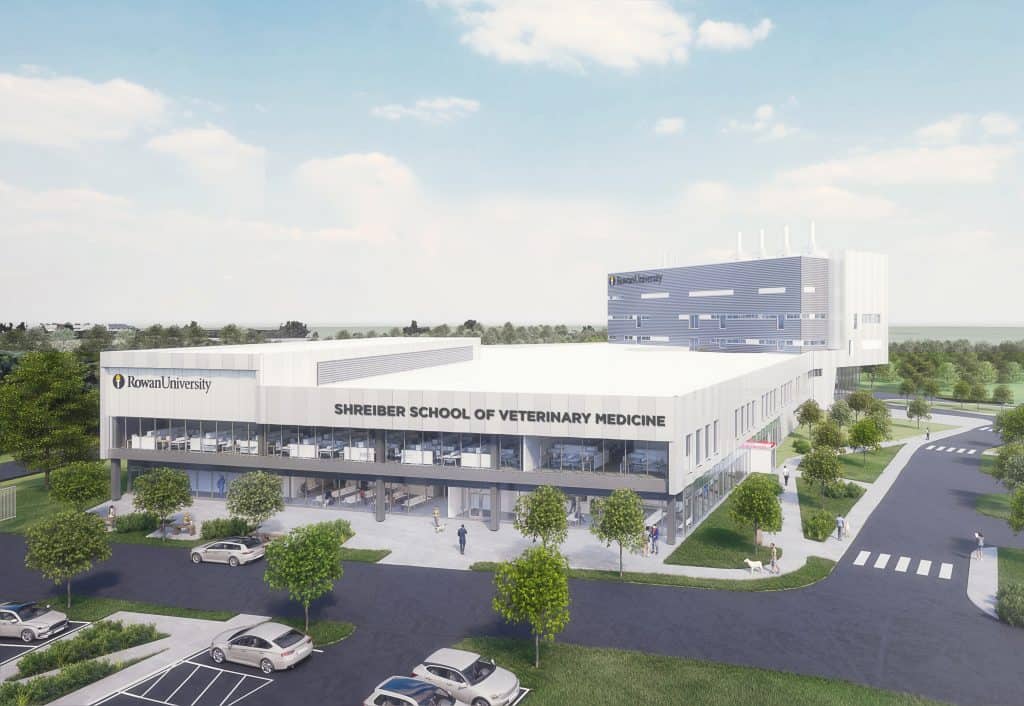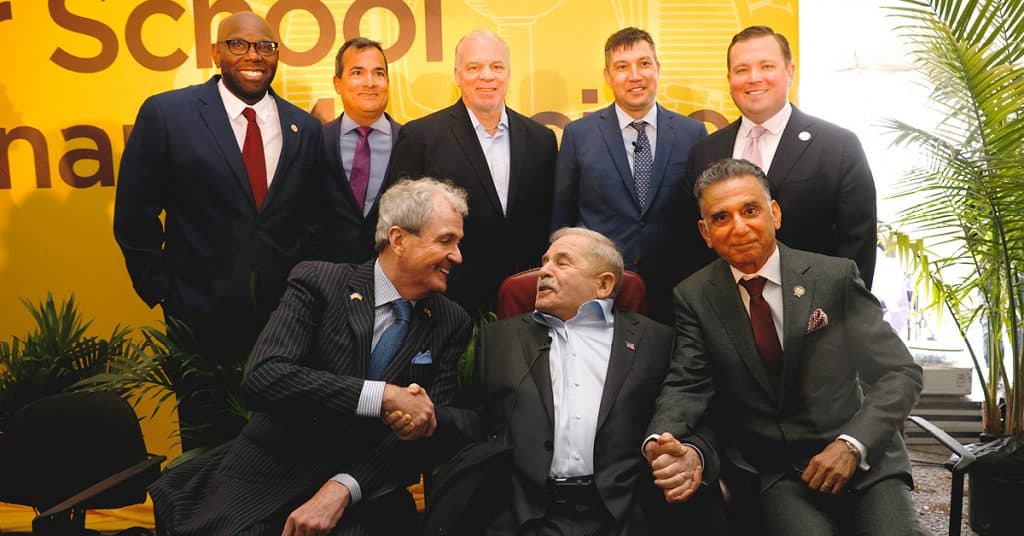

This artist’s rendition on the first-ever veterinary school in New Jersey was on display during the recent groundbreaking ceremonies.
Shreiber School of Veterinary Medicine will begin classes in 2025
New Jersey youth who aspire to help animals can now realize their dream locally at a new Rowan University veterinary school named for a local businessman.
State officials and educators attended an April groundbreaking at Rowan’s West campus in Harrison Township for the Shreiber School of Veterinary Medicine, named for J&J Snack Foods’ founder Gerald Shreiber.
The Pennsauken businessman and staunch animal welfare advocate donated $30 million to fund the school, which will accept its first class in September 2025.

South Jersey business leader and philanthropist Gerald B. Shreiber (center) was joined by university and other officials to celebrate his $30-million gift to New Jersey’s first veterinary school at Rowan University. They included Gov. Phil Murphy (left) and Rowan President Ali A. Houshmand (both seated).
“It’s an honor to be able to build New Jersey’s very first veterinary school,” said Dr. Matthew Edson, founding dean of the Shreiber school. “Having been born and raised here, I’m looking forward to providing the in-state option I didn’t have access to, to future generations of veterinarians in the Garden State.”
There are 33 veterinary schools in the nation, but just five on the East Coast, noted Edson, who added that it has been a major challenge for state students to study veterinary science because they must compete for out-of-state positions in schools elsewhere.
“We plan to reserve at least 50 percent of the seats in our program for New Jersey residents, so they will benefit from competing for a pool of seats reserved for them,” he said.
“We’re hoping to expand access to affordable veterinary education to those in our state.”
The Shreiber School of Veterinary Medicine is a tribute to the South Jersey entrepreneur, who founded his snack company in 1971 after purchasing an ailing pretzel business with just eight employees, according to the J&J Snack Foods website.
The business is now a national juggernaut of 20 manufacturing facilities that make and distribute everything from its trademark Superpretzel to Luigi’s Italian Ice, churros and funnel cake. J&J averages yearly revenue of $1 billion.
“I’m very sure that there are young people growing up in New Jersey right now that could eventually apply to the veterinary school and pursue their dreams of treating animals with assistance from the gift,” Shreiber noted at the groundbreaking. “That’s very satisfying to me.
“I’m looking forward to that first class walking down the aisle.”
“Mr. Shreiber’s gift will be used to establish an endowment that provides scholarship support for generations of veterinary students,” Edson explained.
“A gift this size will generate substantial yearly returns we can use to fund scholarship’ without affecting the principal value, meaning we can provide perpetual funding for students for years to come.”
Edson’s own practice, Rancocas Veterinary Associates in Mount Laurel, has expanded into a successful, multi-doctor operation.
“As a practicing veterinarian in private practice versus a career academic, I’m driven to make sure our program serves our graduates’ needs to confidently enter practice and understand the needs we as employers have when these students are brought on board,” he said.
“I think that experience really drives our plans for the curriculum here.”
Edson and his staff hope to create a veterinary program at Rowan that produces graduates with preparation for entry-level practice or internship and residency training.
“Early exposure to clinical skills, thorough communications and wellness training, practice management education and broad hands-on experience within our facilities and outside community partners are core to this,” he pointed out.
“We’re also looking forward to helping fill a need for access to veterinary care in our region through our clinical practices.”
Veterinary medicine is more than just caring for pets, Edson said. It is also about public health, research and discovery, food safety and serving societal needs.
“We want the Shreiber School of Veterinary Medicine to be an excellent, student-centered educational program that also will work to meet these external needs as well,” he observed.
Future plans include a possible hospital for large animals, Edson revealed.
“We’re equally committed to providing care for large and small animals and providing students clinical experiences with both,” he remarked. “We’re in the process of establishing an equine/large animal field-service program that will provide care for large animals at area farms, and hope to have this service up and running by this fall.
“We’ve also established partnerships with several outside equine and large animal practices for student experiences,” Edson added. “While our current plans for physical hospital facilities are primarily to serve small animals, there are discussions underway surrounding the potential construction of an equine/large animal hospital as well.”


